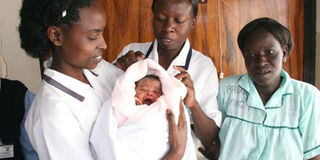Lack of midwife training slows down maternal, infant mortality war

From left: Belinda Kutol, a midwife, and nurse Kudol Maacah inspect a newborn at Moi Teaching and Referral Hospital on December 25, 2008. National Nurses Association of Kenya Midwives Chairperson Louisa Muteti said the last time midwives were trained was nine years ago. PHOTO | JARED NYATAYA | NATION MEDIA GROUP
What you need to know:
- Ms Muteti said midwifery was not only about helping women deliver but also taking care of the expectant women before and after birth, which are important stages in preventing maternal and newborn mortalities.
Victory over the battle on maternal and newborn deaths is far from over as no midwives are currently being trained, resulting in absence of specialists to take care of expectant mothers and babies - an association warned on Thursday.
National Nurses Association of Kenya Midwives Chairperson Louisa Muteti said the last time midwives were trained was nine years ago.
There are only 71 midwives in the country, most of whom are in retirement age while others have left the profession for greener pastures, she said.
“The last class to be trained in midwifery was in 2006. Since then, no midwives have been trained. Midwifery has been incorporated in nursing,” she said during an event to mark the International Day of the Midwife.
Ms Muteti said midwifery was not only about helping women deliver but also taking care of the expectant women before and after birth, which are important stages in preventing maternal and newborn mortalities.
“We request the government to embrace midwifery specialisation with sub-specialties like neonatal care, paediatrics care, research and community midwifery so that we can achieve our Beyond Zero goal for mothers and newborns,” a document titled "Midwives Appeal 2016", which she read, said.





